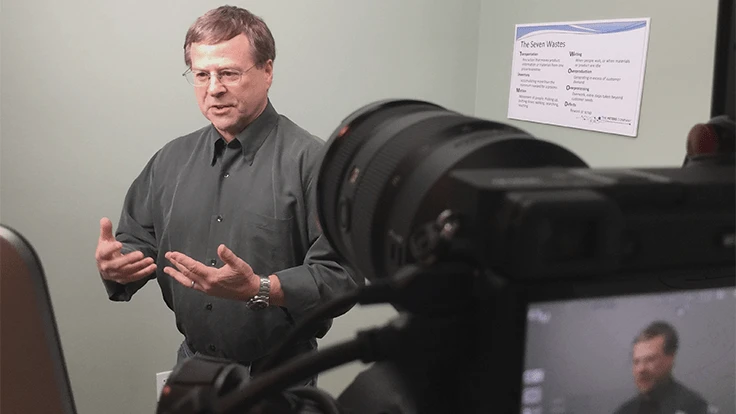
Photo courtesy of The Peters Company.
Many nurseries in the U.S. implement Lean principles at their facilities to improve their overall bottom line and deliver more value to customers. According to The Peters Company, Lean (also known as the Toyota Production System) “is a way of identifying, reducing and eliminating waste in business processes.” In the wake of 2020, they are now moving these previously in-person pieces of training online. A process that was already in the works since 2019, the plan went into overdrive once the pandemic hit the U.S. in March 2020.
According to Rick Peters, president of Oregon-based company, there were some components they had to keep in mind during development.
“Going online initially meant for us to develop self-paced online, training classes. Whether it was one person or a whole class that watched, that was our original intent. So, we began acquiring the knowledge and the equipment necessary to develop that portion of it first,” Rick says.
Peters was contacted by a former client — Jerrin Victor of TerViva, an agricultural tech company based in Florida — who asked Peters if he would be interested to help their team. Before this, Rick hadn’t considered live online classes before. Fortunately, the transition was fairly easy since online courses were already in the works.
“All of a sudden, we just had a different opportunity placed in front of us and we thought, 'Well, can we do this? Well, sure we can!’ The studio was all in place and we'd been recording for the online content for several months,” Rick says.
Rick hit the ground running set up shop into the virtual world. He took some online courses himself and learned how to set up a video studio. All the while, he garnered input from clients and says he learned pretty quickly that sessions had to be short.
“I really appreciated the input as I was going through, especially acquiring information on how to run sound equipment specific for studios. It was important to have what I was being fed in smaller doses. And so that's how we had planned to develop our online courses,” he says.
Elizabeth Peters, vice president of the company, says one of the challenges was the missing element of human contact between the trainer and the trainees.
“That's really important to have that interaction with people in person, because you get better eye contact and that kind of thing. Our classes are really interactive,” Elizabeth says.
Creating the short, online modules proved to be advantageous, because they pivoted to digestible sessions that would better stick with trainees. Additionally, classes could now be taken on the trainee’s own schedule, which last an hour to an hour and a half. Previously, Lean courses lasted half or full days, and to expect trainees to sit in front of a computer for that duration of time would be “too much, too boring” she says.
“One of the principles of Lean is you want it to get away from batch processing as much as possible and into flow. It's taken our training from a big chunk training, sitting in class all day, and turned it into shorter modules that people can digest,” Elizabeth says.
Ultimately, it turned into a “super positive” thing for the company, she says. Rick agrees.
“The pandemic, as untimely as that was, halted a lot of the live training we were doing in a classroom format. But it definitely kicked that capability force into overdrive big time, just like a lot of folks,” he says.
So far, feedback from clients has been positive, many of whom are appreciative that the courses are self-paced and short. They plan on offering live classroom modules and self-paced courses long after the pandemic ends. The courses also allow companies who may not be able to afford in-person sessions with a more cost-effective alternative.
The Peters Company offers nearly 30 different sessions that touch on the Lean principles, all of which range from classroom settings to tactical coursework. Rick says they plan to offer in-person trainings again once it is safe to publicly convene. He also points out that some of the material they teach is sometimes specific to one organization, which harkens back to their company motto:
“Our mission is to build improvement leaders in every U.S. company. The pandemic has actually helped us just get focused and do what we needed to do it. It slowed everybody down for a time, but not the nursery industry, which I'm grateful for.”
Latest from Greenhouse Management
- Anthura acquires Bromelia assets from Corn. Bak in Netherlands
- Top 10 stories for National Poinsettia Day
- Langendoen Mechanical hosts open house to showcase new greenhouse build
- Conor Foy joins EHR's national sales team
- Pantone announces its 2026 Color of the Year
- Syngenta granted federal registration for Trefinti nematicide/fungicide in ornamental market
- A legacy of influence
- HILA 2025 video highlights: John Gaydos of Proven Winners





